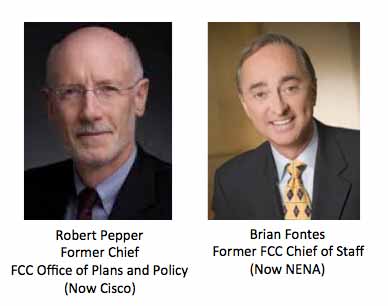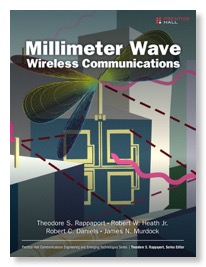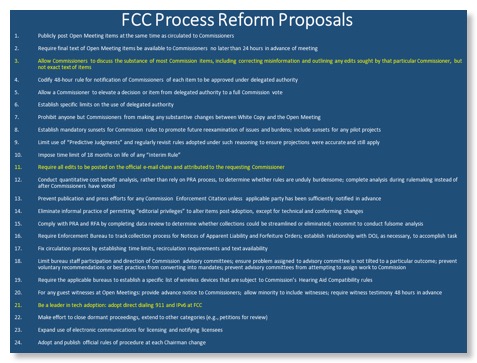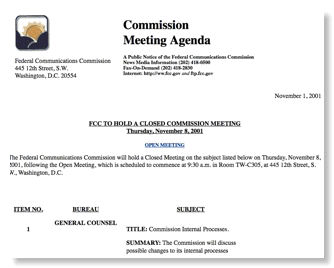2 Unsung FCC Pioneers in Early 5G #HighBandSpectrum Policy

(UPDATE: Robert Pepper is now with Facebook)
There is an implicit viewpoint at FCC that telecom technology is like a "conveyor belt sushi"/kaitensushi /回転寿司 restaurant in Japan: you sit at the counter and various types of sushi come on a conveyor belt in front of you unordered and you just wait until you see one you like and then take it off for eating. So at FCC you just wait for telecom technology to magically come from a conveyor belt and you pick winners and ignore the losers.
Video on "conveyor belt sushi"/kaitensushi /回転寿司 in Japan from NHK
Well, telecom technology does not come by magic! It requires bright people with good ideas and then investment in R&D to work on such ideas. In radio technology, the risk of that investment and thus its commercial likelihood depends on regulatory risk of FCC approving the commercial use and hence profitability of the technology.

"it took about ten years for low-cost commercial products to evolve from 1998 (sic) when USA became the first country in the world to authorize low-power 60 GHz operation…(S)hort range wireless networks provided the relevant applications to take advantage of unlicensed 60 GHz spectrum, as well as other frequencies in the mmWave band…Due to the inherent nature of mmWave frequencies … many emerging or future mmWave wireless products and standards (such as 5G mmWave cellular, inter vehicular communications, and backhaul/fronthaul communications standards) are likely to share characteristics with the 60 GHz WPAN/WLAN standards.
Thus #HighBandSpectrum 5G did not come unsummoned from a sushi conveyor belt, but derived from earlier visionary FCC action in Docket 94-124 in the Hundt Chairmanship. In my main website I have given more background of how this came about, here let me emphasize the role of the 2 individuals shown above.
When I proposed the concept of a 60 GHz unlicensed band in late1992 to the leadership of FCC's Office of Engineering and Technology, it was immediately rejected. This was probably because of the FCC culture related to "Nobody every got fired for buying IBM", i.e. if you only do things major regulatees propose you can never be criticized. (At the time I was working in EB's predecessor FOB as part of an "internal exile" resulting from the Docket 81-413 proceeding that is now known as the basis of Wi-Fi and Bluetooth but which at the time was very controversial.)
After the OET rejection, I sought guidance from Dr. Robert Pepper - legendary Chief of the FCC's Office of Plans and Policy (now OSP) from 1989 to 2005 - an amazing tenure in a very partisan agency. Bob was interested in the idea when I presented it to him, he asked me many questions and then proposed a meeting with the Chairman's Office to discuss the issue. This was during the Quello Chairmanship and Dr. Brian Fontes, his long term staffer was his Chief of Staff. Bob came with me to the meeting with Brian and the then Chief of OET. We both gave our viewpoints and Brian agreed with me that we should start drafting an NPRM for unlicensed use of 60 GHz - far above the then upper limit of FCC radio service rules at 40 GHz. The NPRM was drafted and approved on 10/20/95 under Chmn. Hundt who succeeded Quello. The R&O was adopted on 12/15/95 and by that time both Dr. Pepper and Dr. Fontes had left FCC after many years of loyal service.
Bob is now Vice President, Global Technology Policy at Cisco. Brian is now Chief Executive Officer of the National Emergency Number Association.
I hope that the 5G community can now remember that these two gentlemen played a key role in the early development of 5G #HighBandSpectrum policy in starting the "conveyor belt" moving at a time when the cellular mainstream had little or no interest in upper spectrum bands and thus giving us the wonderful technology that was approved yesterday!
Are 5G Spectrum Deliberations at the Expense of All Other New Technology?
We will be repeating the proven formula that made the United States the world leader in 4G: one, make spectrum available quickly and in sufficient amounts; two, give great flexibility to companies that can use the spectrum in expansive ways; and three, stay out of the way of technological development. We will also balance the needs of various different types of uses in these bands through effective sharing mechanisms; take steps to promote competitive access to this spectrum; and encourage the development of secure networks and technologies from the beginning.
These statements are very admirable. But do they mean that 5G is not only FCC's highest goal but its only new technology goal at present — perhaps other than NAB's pet project of ATSC 3.0?
Is FCC interested in making new spectrum available "quickly and in sufficient amounts" for any other types of spectrum licensees - licensed or unlicensed? If 5G gets absolute priority at FCC on spectrum access, what about others needing spectrum that is not even in conflict with 5G spectrum? Are they entitled to consideration of "spectrum quickly and in sufficient amounts" if the request is noncontroversial? Is FCC spectrum policy productivity so low that only one new technology issue can be discussed at a time?
People may forget that the unlicensed ISM bands made available in Docket 81-413 were widely opposed by incumbents, even the predecessor of CEA now CTA, and had almost no corporate support in the rulemaking is now the basis of BOTH Wi-Fi and Bluetooth. There was some participation of predecessors of today's cellular carriers in Docket 94-124 that created the 60 GHz band that in turn stimulated much of the R&D responsible for #HighBandSpectrum 5G and which is about to be expanded in Docket 14-177. But they were focusing on obscure details and seemed mainly interested in computer-to-computer communications, not anything even vaguely resembling 5G. Reagan had a point when he warned against governments "picking winners and losers": Enabling 5G in a timely way should not be at the expense of slowing down all other new radio technologies not in conflict due to bottlenecks in FCC deliberative processes.
We frankly don't know what the "killer apps" technologies will be 10-20 years from now. In my most megalomaniacal phantasies in the early 1980s when I was working on Docket 81-413 I count not imagine how ubiquitous ISM band uses such as Wi-Fi and Bluetooth might become. Even the pioneers of 802.11, led by NCR which has never sold consumer electronics, thought they were developing a wireless LAN for wireless PC-based cash registers for department stores. Had they approached FCC with such a request in the absence of the Docket 81-413-developed rules I am sure they would have been politely told to go away. (Indeed, in the 1990s, before the commercial availability of Wi-Fi, Kodak approached FCC several times for a special band for downloading pictures from digital cameras to photo printing machines in camera shops and was told to go away. Ultimately Wi-Fi was capable of this functionality.)
This week UK's Ofcom released a bold NOI-like document on fixed service bands. It included the following text:

By contrast the FCC 5G proceeding has mentioned twice the possibility of other uses of #HighBandSpectrum:

There has been no further action on any uses of spectrum above 95 GHz, let alone above 75 GHz! While Ofcom acknowledges the existence of WRC-19 Agenda Item 1.15 on new allocations in 275-450 GHz, can you find any mention of this on the FCC's voluminous website?
So let's cheer the adoption of the 5G rules this week, but let's also ask whether FCC can now deal with other innovative technologies. Perhaps FCC can even explain how it will implement the provisions of § 7 of the Communications Act? Under the Chevron Doctrine FCC can do that and the courts must give deference, but FCC has given no public guidance on how it deals with new technology in the 30+ years since § 7 was enacted.
All new technologies matter and are entitled to timely consideration.
Comm. O'Reilly on FCC Reform
Can't We Have BOTH Commissioner Control and High Throughput?

On July 8th, Comm. O'Reilly published in the FCC's blog a post entitled "Snapshot of Process Reform Ideas" giving the 24 proposals listed above. He says that the ones indicated in yellow "have been adopted in whole or in part".
Presidential appointment certificate

§4(i),(j) clearly states "The Commission may perform any and all acts, make such rules and regulations, and issue such orders, not inconsistent with this chapter, as may be necessary in the execution of its functions…The Commission may conduct its proceedings in such manner as will best conduce to the proper dispatch of business and to the ends of justice." (This is supplemented by the role of Chairman as described in §5.)
The 5 commissioners should work out among themselves a modus operandi that is both efficient and meets the requirements of the statute. They don't need us to cheer them on - often in partisan ways. As I have noted before, FCC could use occasional closed Commission meetings from time to time to discuss internal processes and their improvement. The Government in Sunshine Act generally requires open meetings for multiple member agencies BUT there are exceptions. Specifically 5 USC § 552b(c)(2) provides one for meeting that "relate solely to the internal personnel rules and practices of an agency". As far as I can tell, the last time there was an FCC closed meeting on any matter was the one announced below on November 1, 2001:
While the proposals of Comm. O'Reilly would certainly lead to more commissioner involvement in FCC decision, nothing is said about whether they would increase throughput or possibly decrease it. While some may feel that FCC throughput in areas such as net neutrality and STB regulation should decrease, an unintended side effect might be to decrease throughput in all policy areas of FCC jurisdiction. As we have discussed before and discuss below, FCC throughput in spectrum policy is already too low and is threatening innovation. The cellular industry;s demand for action on #HighBand Spectrum this week as well as NAB's demands for quick action on ATSC 3.0 show there is support for fast FCC action in some areas of its jurisdiction. Indeed, recurring dismissal of thousands of proceedings because they are "stale" is not an accomplishment — rather a sign of a current deep productivity problem.
But let me also address Comm. O'Reilly's point #21 - "Be a leader in tech adoption: adopted direct dialing 911 and iPv6 at FCC" - which he appears to classify as having "been adopted in whole or in part". Perhaps these 2 specific tasks have now been accomplished, but does this make FCC "a leader in tech adoption"? Yes, new technologies are being approved as no doubt 24+ GHz 5G will be this week. Yes, FCC moved quickly on ATSC 3.0 in response to NAB's petition and requested comments a mere 6 weeks after the petition. But petitions for new technology that do not come from CTIA or NAB often just gather dust for years! 30 years after its adoption the Commission has no coherent explanation of how it deals with the new technology provisions of §7 or any guidance for regulatees on submitting such requests. Indeed, at least one prominent private lawyer believes that anyone seeking to use the provisions of §7 will be punished with extra delay!
While it is easy to just think cynically that CTIA get special treatment because it is so important and that no one else should reasonably expect such treatment, we have pointed out that in the case of cellular booster interference to cellular systems (Docket 10-4) even CTIA had to wait 10 years from when they first stated to FCC that "urgent action is needed"! In the case of FM broadcast interference to nearby 700 MHz cellular base stations FCC apparently refused to take any action or even make a statement on the problem (which appears to be condoned by ambiguities in the present FCC Rules) and verbally told the affected parties to solve it themselves. So while CTIA may be the prodigal child, FCC productivity is so low now in spectrum policy even this prodigal child appears to have choice of getting what they want in new spectrum or getting their interference problems solved - but not both!
Prominent spectrum lawyer Mitchell Lazarus pointed out in comments in the "Wireless Innovation NOI", Docket 09-157 - which itself has been stalled for years and theoretically still open - that even noncontroversial marginal innovations on existing services often stall for YEARS at FCC if they need Commission action for a waiver or rule change. I could also point out that both the IEEE-USA request for a declaratory ruling on technology above 95 GHz and their status under §7 as well as the more specific request from Battelle Memorial Institute for Part 101 service rules in the virgin spectrum at 102-109.5 GHz have both been stalled for years at FCC without any resolution.
Does this make FCC "a leader in tech adoption"?
What do you think its impact has been on capital formation for R&D in cutting edge wireless technology - other than specific technologies favored by the cellular industry?
I have discussed this low productivity in spectrum policy for innovative technology and its shortfall with respect to demands ifor spectrum policy in a paper at last year's TPRC. To put it simply, it is as if the demand for spectrum policy is equivalent to 6,000 pages of FCC decisions each year, but the 8th Floor deliberation process as presently structured can only produce 4,000 pages. I don't see anything in the Comm. O'Reilly's reform ideas that would increase the throughput of the 8th floor about the present perhaps 4,000 pages/year. He has previously written about his "right to vote" but not about the implications of high level deliberation on esoteric matters.
Should the issue really be that the 5 commissioners can vote on the most important issues that they categorize as such?
Then leave the other issues that have to be resolved to the staff to handle under delegated authority in order to get the people's business done in a timely way? If the commissioners want to vote on the wireless competition reports to Congress, why not? However to meet real productivity requirements and goals the will have to get less involved in more obscure matters to which they - and their present staff - often add little value. These are often technocratic matters in spectrum policy such as allowing any licensed or unlicensed use above 95 GHz - a limit reached by FCC in 2003.
If the board of directors of General Motors chose to try to control the firm by voting on every design change of every model, next year's Chevy could never be produced on time. Similarly at FCC there is a tradeoff between level of direct involvement of commissioners and agency productivity/timeliness.
.While UK's Ofcom Board is not exactly the same as the commissioners under our legislation, it has found ways to both delegate most decisions to the Ofcom staff under clear general policy guidelines and to have real oversight of the staff. FCC's delegations of authority to its staff have changed little in decades and focus mainly on precedent, not on significance, let alone the impact of a longer 8th Floor deliberation. Should FCC, or at least the FCC of the next administration, fundamentally review its delegation of authority structure?
Having spent nearly $1M on an outside study of field enforcement in recent history, shouldn't improving FCC policy productivity be more important?




![Validate my RSS feed [Valid RSS]](valid-rss-rogers.png)

